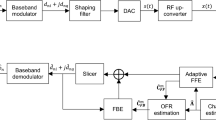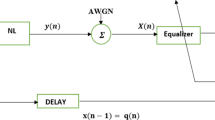Abstract
In a high-rate indoor wireless personal communication system, the delay spread due to multipath propagation results in intersymbol interference (ISI) which can significantly increase the transmission bit error rate (BER). Decision feedback equalizer (DFE) is an efficient approach to combating the ISI. Recursive least squares (RLS) algorithm with a constant forgetting factor is often used to update the tap-coefficient vector of the DFE for ISI-free transmission. However, using a constant forgetting factor may not yield the optimal performance in a nonstationary environment. In this paper, an adaptive algorithm is developed to obtain a time-varying forgetting factor. The forgetting factor is used with the RLS algorithm in a DFE for calculating the tap-coefficient vector in order to minimize the squared equalization error due to input noise and due to channel dynamics. The algorithm is derived based on the argument that, for optimal filtering, the equalization errors should be uncorrelated. The adaptive forgetting factor can be obtained based on on-line equalization error measurements. Computer simulation results demonstrate that better transmission performance can be achieved by using the RLS algorithm with the adaptive forgetting factor than that with a constant forgetting factor previously proposed for optimal steady-state performance or a variable forgetting factor for a near deterministic system.
Similar content being viewed by others
References
W. Zhuang, W.A. Krzymien and P.A. Goud, “Trelliscoded CPFSK and soft-decision feedback equalization for microcellular wireless applications”, Wireless Personal Commun., Vol. 1, No.4, pp. 271–285, 1995.
S. Stein, “Fading channel issues in system engineering”, IEEE J. Select. Areas Commun., Vol. SAC-5, No.2, pp. 68–89, Feb. 1987.
S.U.H. Qureshi, “Adaptive equalization”, Proc. IEEE, Vol. 74, No.9, pp. 1349–1387, Sept. 1985.
L. Ljung and T. Söderström, Theory and Practice of Recursive Identification, MIT Press, Cambridge, 1983. Chapter 2.
S. Haykin, Adaptive Filter Theory, 2nd Edition, Prentice Hall: Englewood Cliffs, 1991. Chapter 13.
E. Eleftheriou and D.D. Falconer, “Tracking properties and steadystate performance of RLS adaptive filter algorithms”, IEEE Trans. Acoust., Speech, Signal Processing, Vol. 34, No.5, pp. 1097–1109, Oct. 1986.
S.D. Peters and A. Antoniou, “A parallel adaptation algorithm for recursive-least-squares adaptive filters in nonstationary environments”, IEEE Trans. Signal Processing, Vol. 43, No.11, pp. 2484–2495, Nov. 1995.
T.R. Fortescue, L.S. Kershenbaum, and B.E. Ydstie, “Implementation of self-tuning regulators with variable forgetting factors”, Automatica, Vol. 17, No.6, pp. 831–835, 1981.
W.C. Jakes (ed.), Microwave mobile communications, New York: Wiely, 1974.
A.A.M. Saleh and R.A. Valenzuela, “A statistical model for indoor multipath propagation”, IEEE J. Select. Areas Commun., Vol. SAT-5, No.2, pp. 128–137, Feb. 1987.
H. Hashemi, “The indoor radio propagation channel”, Proc. IEEE, Vol. 81, No.7, pp. 943–967, July 1993.
D.D. Falconer, “Jointly adaptive equalization and carrier recovery in two-dimensional digital communication systems”, Bell Syst. Tech. J., Vol. 55, No.3, pp. 317–334, Mar. 1976.
Author information
Authors and Affiliations
Rights and permissions
About this article
Cite this article
Zhuang, W. RLS Algorithm with Variable Fogetting Factor for Decision Feedback Equalizer over Time-Variant Fading Channels. Wireless Personal Communications 8, 15–29 (1998). https://doi.org/10.1023/A:1008856607190
Issue Date:
DOI: https://doi.org/10.1023/A:1008856607190




